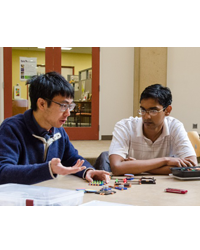
GSE-bred start-up gets Chinese help to develop kits to teach electronics
Two student-entrepreneurs who met through the Graduate School of Education's Transformative Learning Technologies (TLT) Lab left for China this week for a three-month residency in one of the country's leading tech incubators, HAXLR8R. Their nascent company, LightUp, is developing a low-cost modular kit to simplify the way students learn basic electronics and logic.
Josh Chan, who recently graduated from the Stanford Teacher Education Program (STEP), and Tarun Pondicherry, a graduate student in electrical engineering, began developing their prototype kit last summer, after a timely introduction brokered by Paulo Blikstein, director of the TLT Lab and assistant professor of education. While each had taken Blikstein's "Beyond Bits and Atoms" design course in different years, Blikstein noted a sharp similarity between their final projects for the class, and an ongoing project in his lab of developing a new breed of low-cost kits for robotics and electronics.
After almost a year of work, a conference publication, and extensive use of Blikstein’s digital fabrication lab — the first of its kind in a school of education — a company was born. "It would be hard to calculate the labor costs (for the prototype)," Chan said. "We spent a lot of nights wrapping magnets, usually while watching a movie." LightUp is the first hardware start-up to emerge from the TLT Lab, an interdisciplinary lab, housed at the Graduate School of Education, which develops new educational technologies.
The LightUp model, held together with magnets clad in copper conducting tape, allows students to build circuits without wires, alligator clips, breadboards or soldering. And while some other modular circuit kits consolidate and conceal some functions under a plastic shell, all the connections and components in the LightUp system can be manipulated individually.
"We wanted to do away with all the unnecessary construction issues that complicate kids building circuits," said Pondicherry. "But we didn't want to do away with any of the electronic concepts. We did our best to make it as transparent as possible."
The incubator, HAXLR8R, is located in Shenzhen, the center of hardware development in China, and run by venture capital firm SOSventures. Its advisors include Atari’s founder Nolan Bushnell and other high-profile inventors. There, Chan and Pondicherry will spend the next three months developing a manufacturing process for mass-producing the kits. The incubator offers mentorship in business development, connections to suppliers and other key elements needed to get a product to market.
"Our goal is to set up enough infrastructure that once we launch a funding campaign we should not have any issues that would get in the way of delivering a product," said Pondicherry. Meanwhile, the team will meet via teleconference with Blikstein to keep advancing the design of the product and run user tests in school in the Bay Area.
Upon returning to Stanford, Chan and Pondicherry plan to run more academic studies of the product, advised by Blikstein and conducted under the auspices of the TLT Lab. Chan said his background in STEP will pay off when it comes time to develop curriculum and document the effectiveness of the system. "I'm fortunate I had that experience," he said. "Many of the assignments were about lesson planning and assessment. Now it's going to be helpful to have that understanding of what's most useful for a teacher."
LightUp is the first company incubated at Blikstein’s TLT Lab, but not the first product. The lab also sprung the SLATE learning system and the GoGoBoard, a low cost robotics kit. Created in 2009 at Stanford, the lab offers educational designers high-end prototyping equipment such as 3D printers and laser cutters, while developing robust research on the effectiveness of these new educational products.
“We interact with technology everyday but we understand very little about how it works,” Blikstein said. “LightUp was designed to blow that black box wide open.”
This work was made possible by funding from the Graduate School of Education's Lemann Center for Educational Entrepreneurship and Innovation in Brazil. The center supports research projects that advance new education technologies and approaches that would benefit not only Brazil, but also developing economies at large.
David Plotnikoff is a writer in the San Francisco Bay Area who contrributes to the GSE website.



